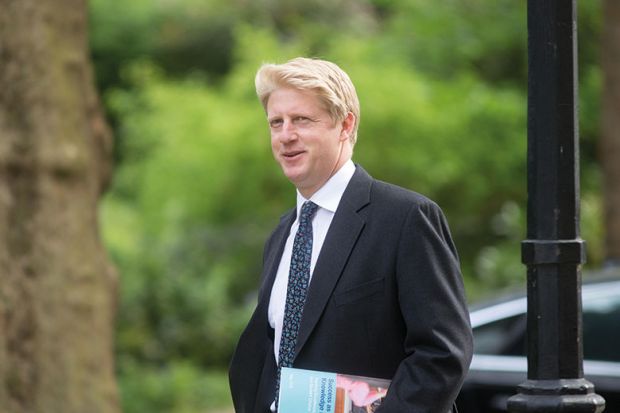The UK government could be compelled to accept the return of post-study work visas for overseas students after Jo Johnson’s plan to force its hand attracted significant Conservative support – including from his brother Boris, the front-runner to be next prime minister, and Sajid Javid, the home secretary.
Jo Johnson, the former Tory universities minister, tabled an amendment to the immigration bill in April, alongside Labour MP Paul Blomfield. The amendment, which has gained cross-party support, aims to force the government to allow overseas students to stay in the UK “to search for work or gain work experience” for “a period of at least two years” after the completion of their courses.
The amendment also aims to prevent any government from capping overseas student numbers without parliamentary approval.
In light of the scale of Tory support, there is now an expectation that the government will accept the amendment rather than risk an embarrassing defeat, Times Higher Education understands.
Seventy-five MPs from all parties have signed up to back the amendment, including 26 Conservatives – among them Boris Johnson and Sir Graham Brady, until recently the chair of the 1922 Committee of Tory backbenchers. The Conservatives do not have a majority in the Commons and rely on support from the Democratic Unionist Party, whose education and international trade spokespeople have signed up to support Mr Johnson’s amendment.
That Mr Javid – who is running for the leadership and who leads a Home Office that has been the major block on visa reform alongside Ms May – has signed up to back the amendment adds to the impression that the government will not be able to resist the amendment. He wrote in an article for the Financial Times: “It makes no sense to send some of the brightest and most enterprising people in the world straight home after their time here.”
The decision to abolish post-study work visas in 2012 – taken while Theresa May was home secretary – is seen as a major factor in the subsequent collapse in Indian student recruitment at UK universities, in particular.
The UK’s offer is seen as unattractive to students, compared with the generous post-study work visa offers from key global rivals in international student recruitment: the US, Canada, New Zealand and Australia.
The weakening of Ms May, soon to exit as prime minister, may have removed the last obstacle to liberalisation of the UK’s student visa regime – and universities could perhaps seek to push for further reforms.
The immigration bill is now in its report stage in the House of Commons. It might be expected to come back to MPs for its third reading after the summer recess, once the next Conservative leader and prime minister has been chosen. However, the bill concerns the post-Brexit immigration regime – so its fate hinges on the future of the Brexit process.
Vivienne Stern, director of Universities UK International, said that accepting the amendment “would be a massively positive move on the part of government, and would correct a long-standing policy barrier to growth in international student numbers.”
UK international student recruitment has “stagnated” in recent years, she said, “largely due to our uncompetitive visa offer”.
“The UK benefits enormously from our appeal as a study destination, but we have been holding ourselves back,” said Ms Stern. “This change would make a real difference, and the whole country would benefit as a result.”
Register to continue
Why register?
- Registration is free and only takes a moment
- Once registered, you can read 3 articles a month
- Sign up for our newsletter
Subscribe
Or subscribe for unlimited access to:
- Unlimited access to news, views, insights & reviews
- Digital editions
- Digital access to THE’s university and college rankings analysis
Already registered or a current subscriber? Login








